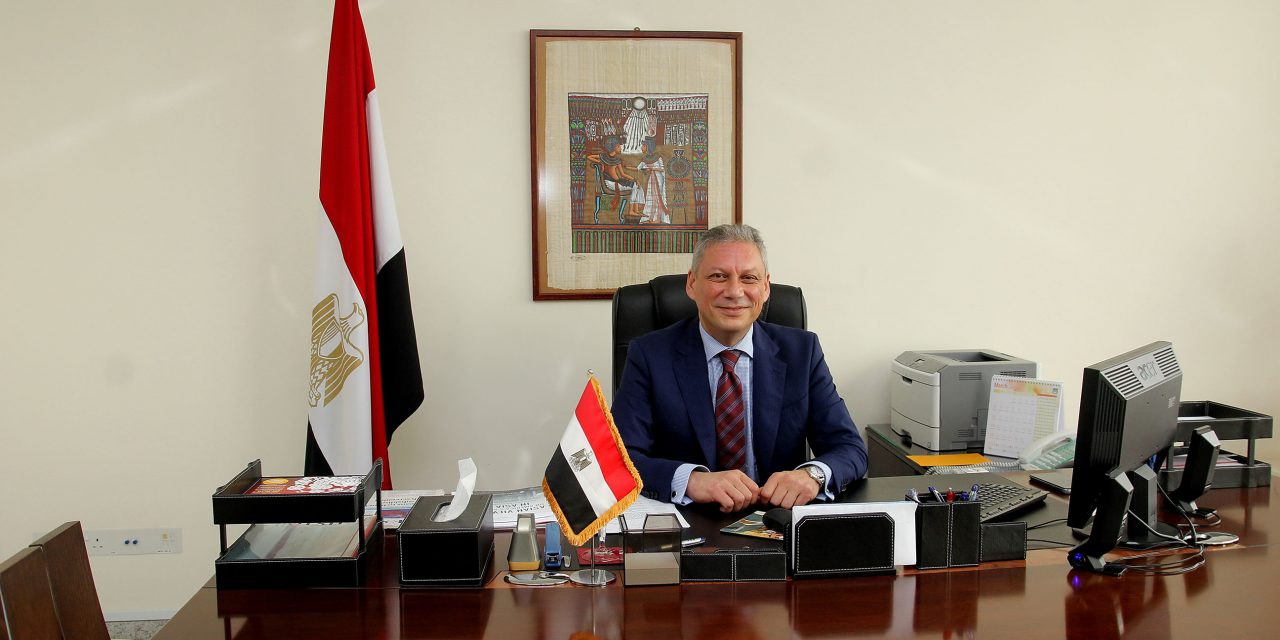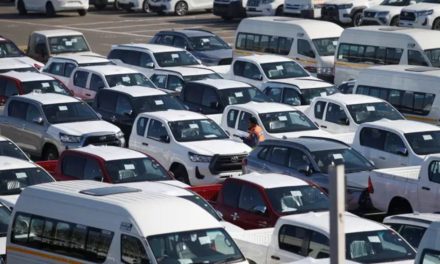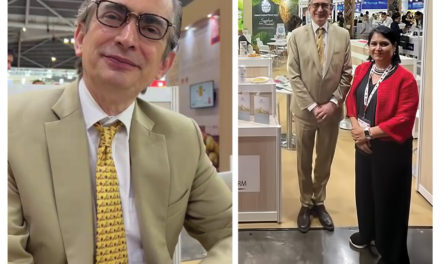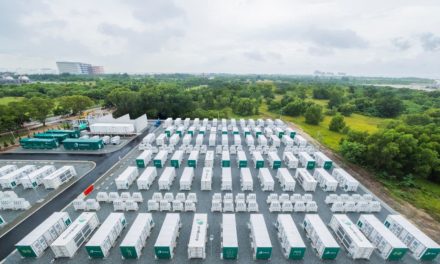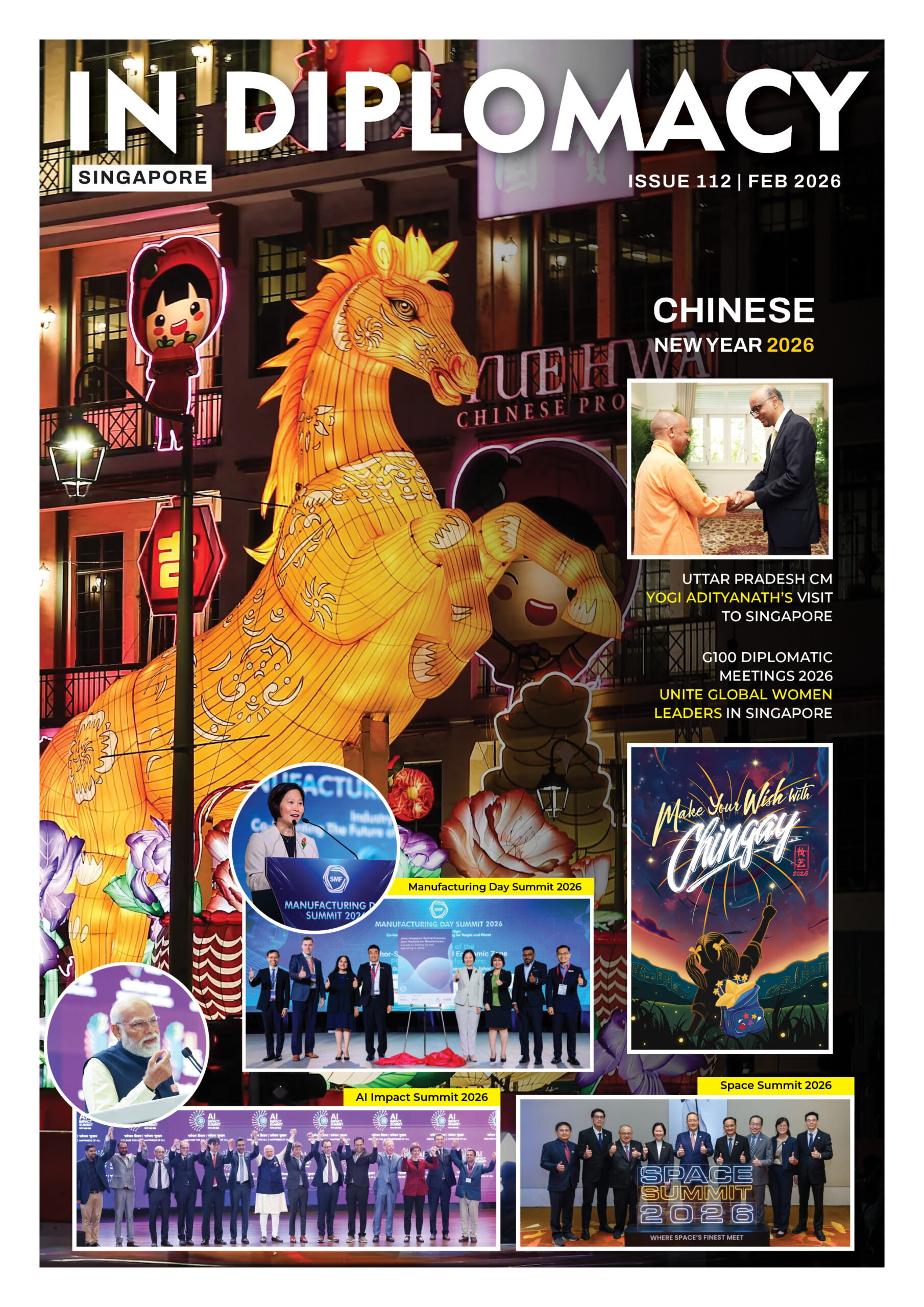It has been about five months since the 50-year old career diplomat has settled down in Singapore. It has been a smooth transition for HE Mohamed Abulkhier who has more than a passing resemblance to Daniel Craig, the actor who is the current star of the James Bond films fame. Indeed, we found the Egyptian diplomat’s demeanour to be just as suave and he was as dapper, in an immaculate suit, as the screen British spy, along with a playful hint of humour in his eyes.
Start in diplomacy
“My father is a retired ambassador and together with my late mother they had been trying to convince me to join the Foreign Service since high school. Right up till my first year in university (where I majored in economics) I was against it. Partly it is a reaction to the lifestyle I underwent travelling with them round the world. But apparently something resonated very deep inside me about diplomacy when my Cairo University colleagues who studied economics with me convinced me to go into Foreign Service. They had graduated and experienced first hand working in the Foreign Service themselves.”
“When I joined, as they say, I landed running. Everything I had absorbed from my family life, from my father, was called into play as my first posting was in Tunisia from 1992 to 1996. It was a very, very interesting time to be there as the Olso Accords were being worked out, I witnessed the whole negotiations from Tunisia where the Palestinian Liberation Organisation (PLO) was based until the Palestinians moved from there to the Occupied Territories in Palestine. After that I went back to Cairo, to the European Sector for two years.”
His work then included overseeing the whole relationship with Europe and the security organisations there such as NATO. Following that he was posted to Washington DC from 1998 to 2003. “Washington was another very rich experience as I came when President Bill Clinton was being impeached, then the 2000 presidential election controversy between Al Gore and George W Bush, then there was 9/11…
So they were interesting times especially since I was handling congressional affairs on the House side – basically lobbying US Congress promoting and defending Egypt’s interests. After that I went back to Cairo for three years serving in the Foreign Minister’s Office handling US-Egyptian affairs during rather challenging times as we had issues with the US administration at that time.”
Then he went to Geneva for four years (2006 -2010) practicing “multi-lateral diplomacy” taking part in the World Trade Organisation (WTO) Doha Round negotiations. He smiled recalling that period and explained, “You might say multi-lateral diplomacy such as this has its own charms and adrenalin rush. But you work so hard for so many years and sometimes the advancement is (he opens a one-inch space between his thumb and index finger) that big.”
On the whole though looking back, he considers himself very fortunate to have served in the Foreign Ministry’s top bi-lateral and multi-lateral posts. Richer (in experience) and more interesting postings were in store ahead in his career as his next foreign posting was as Deputy Ambassador of the Egyptian embassy in Rabat, Morocco for three years. “The embassy was very active with a high level of bilateral relations and there were many delegations coming and going.” The stint contributed greatly to his career. He returned to Cairo spending two years there before coming to Singapore.
“The first year in 2014 as Deputy Assistant Foreign Minister in charge of Arab Mashreq Affairs basically overseeing four countries: Syria, Iraq, Lebanon and Jordan. That was quite intense. The second year I was Deputy Assistant Foreign Minister for UN Specialised Agencies (such as UNESCO, ILO, WHO etc). It was back to multi-lateral diplomacy. I was at first a bit hesitant but I was persuaded by the Assistant Minister of Multi-lateral Affairs and it proved to be quite a rich experience.
ND: You bring a wealth of experience and with you in charge. How is the status of Singapore – Egypt relations as of now and where you would like to bring it to in the next few years?
MA: The relations are very warm especially between people-to-people and government-to-government fronts. There is a great potential to translate these warm relationships to something more concrete on the ground. Things are happening but there is potential for so much more.
In 2015, President Abdel Fattah el-Sisi was on a very successful visit to Singapore that brought relations to a new level. There was greater cooperation in different fields and the momentum was further energised by the visit of President Tony Tan to Egypt in 2016. Both our respective ambassadors have been working very hard to capitalise on those visits.
The potential is there in the private sector for investments and economic cooperation especially opportunities in the Suez Canal Economic Zone. We have passed new investment laws giving it more independence and fast tracking of projects and incentives for investments. The Zone benefits from its unique geographic location and businesses can benefit from Egypt’s free trade agreements such as COMESA (the Common Market for Eastern and Southern Africa), AGADIR and the EU.
ND: Let’s talk about investments…
MA: Yes, there’s a lot of interest from here in Egypt… not for activities in Egypt alone but also the region from an Egypt based presence. The Egyptian market is a big potential …Egyptians are great consumers of everything…. So the private sector relationship is definitely going to be based on mutual gains. It’s always going to be a win-win situation.
The potential that Egypt has as an Egyptian market and in the Suez Canal Zone is immense for Singaporean companies… especially now, at a time when there is some kind of uncertainty vis-a-vis the world economy. While bearing in mind that Singaporean companies always prefer their own region because they know the culture…the people…the laws.. they know everything about it), Egypt for Singapore is not a risk….but a new market with new laws…a new culture…new people with a great potential. It’s not easy, but now since Singaporean companies are looking more and more at Egypt it is a great achievement, especially in light of the success stories achieved thus far by companies like OLAM in Agriculture and PIL in logistics and others… and here we are working hard to connect them to companies there, whether it is for trade or investment or even co-operation in something like education.
ND: What is happening on the education front?
MA: There is the Government-to-Government aspect that we are working on to enhance the cooperation by which Egypt can benefit from Singapore’s extraordinary experience in education, and there is also the private-to-private sector aspect. There’s a Singaporean company who is looking at setting up an academy there for vocational training. I believe it would be highly beneficial to both sides. In this case, the academy’s administration would be handled by Singaporean officials and the rest of the team would be made up of Egyptians and that would be good for the transfer of know-how as well. The other thing is that in Egypt we do need institutes like this in order to train our people to address the needs of the labour market in different fields.
We have many programmes and projects in Egypt that are implemented by the UN and other specialised agencies and these do have a training component. My vision is that if there’s an academy such as this in Egypt it’s going to be very successful because it has the Singapore brand name. We can also benefit from this academy by training those who are going to be trained through projects implemented by the UN and specialized agencies. So instead of having to keep a certain amount in dollars aside for the money allocated for the training component in the UN projects, this we can do this right here in Egypt… at a lower cost.
We also have an interest from Egyptian private sector educators and investors to visit Singapore to study the possibility establishing a school in Egypt adopting the Singaporean system, and also establishing a vocational training institute in accordance with Singaporean Standards. The Embassy is working on both those aspects.
ND: What is trade like between Egypt and Singapore?
MA: We are working hard to encourage more trade between the two countries. It’s not very much right now but there is enormous potential. The Singapore embassy in Egypt is working very hard and I am trying to compete with it here! (He smiles broadly). We are working hard because of our conviction and dedication to take our ties forward. This is very important because both will benefit from this. These warm feelings between Egypt and Singapore are bringing bilateral relations closer.
One of the very important things taken up during President El Sisi’s visit here was the matter of water de-salinization. And, Singapore has very advanced technology in this.
I have visited the (Hyflux) plant, it’s very impressive. But what’s important too, is that this technology is not only critical in providing potable water for the people; it also provides security and peace amongst nations. Almost two decades ago there was an analysis that predicted conflict in the Middle East would be over water. And now you have this technology for water…that scenario is now completely out of the equation.
We are also looking into port management and operation in Egypt. On the Suez Canal Zone we have many ports so we are looking for cooperation in creating a master vision for Egyptian ports and how they can complement each other with the assistance of Singapore. There is also the area of training Egyptian port officials in Singapore that we are looking on enhancing, within our efforts to expand the cooperation in the field of vocational training.
ND: Egypt has been considered an excellent tourism product. How do you want to enhance the numbers of visitors from Singapore.
MA: There are two primary potential areas in Egypt’s tourism portfolio:
- Its Pharonic history…the Valley of Kings…the Pharonic temples..the pyramids and museum in Cairo, the relevant cruises between Luxor and Aswan.
- Beaches, resorts and diving by the Red Sea.
The beaches are not such a huge attraction for Singaporeans, because there are already many in this region, making the distance and air fares costs very high by comparison. What does interest Singapore travelers is the Pharonic heritage of Egypt.
There’s a third potential as we see it – and this is specifically between Egypt and Singapore – is in a special field for cooperation: the Al -Azhar University which disseminates the tenets of the Islamic faith. It is leading the world in countering the destructive ideology of extremists, which is a huge challenge for many countries. This university is playing a very important role and we already have around 250 Singapore students studying there. Singapore itself is a good model for tolerance as it has 10 major different religions existing harmoniously here side by side. So we would like to look at tourism for Islamic sites because some Singaporean students have also shown an interest in this area.
ND: Are you planning any promotional activities, events etc here in Singapore?
MA: We are looking at an exhibition here of Egyptian products in 2017, while promoting Tourism on the margins. Singapore doesn’t necessarily import for itself of course, but does so for countries in this region. This is something which we want to tap. I want to also diversify the product range, for example, Egyptian cotton in textiles, bedsheets etc. Some Singaporean companies are interested in importing these to distribute in countries in this region.
ND: For Singaporeans looking to do business with Egypt what should they be mindful of?
MA: There has to be some sort of a bridge between the mentalities of our two peoples and how things are done. Singapore after its Independence has built itself up from a Third to First World country and that is a completely different experience, historically and culturally. Egyptians on the other hand are historically and culturally tied to the Nile. Egyptians always felt the Nile would bring the water and the water was going to bring the agriculture…and there was always this deep sense of security for tomorrow that was brought to them by this. So, while doing business together, we just have to take into consideration the specifics of each one’s culture and history.
ND: Egypt has faced a lot of uncertainities…
MA: Egypt, since the days of the Pharos, has always had the fundamentals of the state: the land/borders, the people and the government. Egyptians, since that time, have always had their own distinctive identity, and they have worked hard to preserve this identity, which is what has saved them from very grave circumstances in the recent years. The Egyptians have been conquered throughout their history but have always managed to preserve their identity until today. After one year of Moslem Brotherhood rule, Egyptians came out in millions and spoke out against them, after feeling that their identity and their country is being taken away from them, among those were Egyptians who actually voted for the Moslem brotherhood.
And now, we are a developing country trying to put the economy back on track after two revolutions. The recent devaluation of the Egyptian currency (past regimes were reluctant to do this) was a bold move. While the floating of the new currency did hit us hard initially, we are seeing things settling down. We are in the process of developing our new investment policy, which will take into consideration our reformed economic agenda, that comes in line with the US$13 billion loan agreement with the IMF. Recent articles published in The Economist and the Financial Times indicated that the Egyptian Economic reform programme is going in the right direction, it’s a matter of time that the economy will pick up.
ND: How have you and the family settled in?
MA: The people have been very warm and welcoming here I feel very comfortable, secure and at home. The ease with which things are done here is wonderful. So it didn’t take me much time to adapt to Singapore and the life in Singapore. And for my first time in Asia, I consider myself very lucky to be here as ambassador as my first posting here. My wife is very active in the diplomatic community and my son (16) and daughter (12) too feel comfortable and secure in school here.

